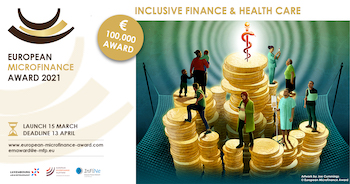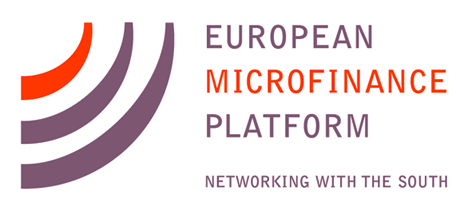CDC Group, a development finance institution backed by the UK government, recently launched an updated environmental, social and governance (ESG) toolkit to assist financial services providers (FSPs) in addressing common ESG challenges such as corruption, money laundering, and gender-based harassment and violence. It is targeted at
Group, a development finance institution backed by the UK government, recently launched an updated environmental, social and governance (ESG) toolkit to assist financial services providers (FSPs) in addressing common ESG challenges such as corruption, money laundering, and gender-based harassment and violence. It is targeted at
Search Results for: measure
MICROCAPITAL BRIEF: Government of India Revises COVID-19 Guarantee Program for Bank Funding of MFIs, Seeking to Enable 2.5m Microfinance Loans
India’s Finance Minister, Nirmala Sitharam, recently unveiled a set of measures intended to boost the nation’s economic recovery following its second wave of COVID-19 infections. One of these is to encourage the distribution of 2.5 million retail microloans by microfinance institutions (MFIs), funded by
Finance Minister, Nirmala Sitharam, recently unveiled a set of measures intended to boost the nation’s economic recovery following its second wave of COVID-19 infections. One of these is to encourage the distribution of 2.5 million retail microloans by microfinance institutions (MFIs), funded by
MICROCAPITAL BRIEF: EBRD Loans $2.4m to ProCredit Bank Bosnia and Herzegovina for Energy Efficiency, Homeowners Eligible for EU Grants
The  UK-based European Bank for Reconstruction and Development (EBRD) recently announced it is lending EUR 2 million (USD 2.37 million) to ProCredit Bank Bosnia and Herzegovina (PCB BiH) to on-lend for residential “investments in insulation, windows, heat pumps, solar panels and other improvements” that reduce energy usage. PCB BiH is a member of Germany’s ProCredit Holding, whose members provide
UK-based European Bank for Reconstruction and Development (EBRD) recently announced it is lending EUR 2 million (USD 2.37 million) to ProCredit Bank Bosnia and Herzegovina (PCB BiH) to on-lend for residential “investments in insulation, windows, heat pumps, solar panels and other improvements” that reduce energy usage. PCB BiH is a member of Germany’s ProCredit Holding, whose members provide
MICROCAPITAL BRIEF: IFC Approves $20m Loan to Agrofértil of Paraguay to Support Farming, Gender Equality Amid COVID-19 Downturn
The  International Finance Corporation (IFC), a member of the World Bank Group, recently agreed to loan up to USD 20 million in working capital to Agrofértil, a company that provides credit, crop insurance, agricultural inputs and “agronomic services” to farmers and farmer cooperatives in Paraguay. Through the loan, which may be renewed yearly for five years, IFC aims to support Agrofértil in its work with farmers cultivating small and medium-sized plots including by endeavoring to “promote
International Finance Corporation (IFC), a member of the World Bank Group, recently agreed to loan up to USD 20 million in working capital to Agrofértil, a company that provides credit, crop insurance, agricultural inputs and “agronomic services” to farmers and farmer cooperatives in Paraguay. Through the loan, which may be renewed yearly for five years, IFC aims to support Agrofértil in its work with farmers cultivating small and medium-sized plots including by endeavoring to “promote
MICROFINANCE WRAP-UP: “Resilience: COVID-19 Crisis Through A Migration Lens;” Published by Global Knowledge Partnership on Migration and Development (KNOMAD)
This  brief provides an overview of recent trends in migration and remittances globally. Overall, remittances to low- and middle-income countries (LMICs) remained relatively stable through the onset of the COVID-19 pandemic, decreasing from USD 548 billion in 2019 to USD 540 billion in 2020. Many countries used “counter-cyclical fiscal policy” to stimulate their economies, which
brief provides an overview of recent trends in migration and remittances globally. Overall, remittances to low- and middle-income countries (LMICs) remained relatively stable through the onset of the COVID-19 pandemic, decreasing from USD 548 billion in 2019 to USD 540 billion in 2020. Many countries used “counter-cyclical fiscal policy” to stimulate their economies, which
MICROCAPITAL BRIEF: Impact Investor Symbiotics Spins Off Consultancy Tameo
Symbiotics Group, a Switzerland-based impact investing firm, recently launched an independent research firm Tameo, which aims to “promote the growth of the impact investing industry by increasing transparency and supporting evidence-based decision-making via independent solutions.” The new firm will provide investors and investment managers with: (1) impact measurement, labeling, reporting and verification services; (2) the publication of benchmarks, indexes and
MICROCAPITAL BRIEF: Kiva Refugee Investment Fund Closes with $32m to Scale Lending to Forcibly Displaced Persons, Host Communities Via Microfinance Institutions
The Kiva Refugee Investment Fund (KRIF), an entity controlled by the US-based NGO Kiva Microfunds, recently completed its first close, with USD 32.5 million raised from
MICROCAPITAL BRIEF: Dominican Republic-Based Banco Caribe to Receive $2.64m, Technical Assistance from Oikocredit to Support SMEs
Netherlands-based cooperative Oikocredit recently invested DOP 150 million (USD 2.64 million) in Dominican Republic-based Banco Caribe to support the country’s small and medium-sized enterprises (SMEs), with the hope that the infusion will “further [motivate] responsible investments in the region.” Additionally, Oikocredit will provide Banco Caribe with technical
SPECIAL REPORT: Christoph Pausch on the European Microfinance Award 2021: Inclusive Finance and Health Care
MicroCapital:  Why was “Inclusive Finance and Health Care” chosen as the topic of the European Microfinance Award 2021?
Why was “Inclusive Finance and Health Care” chosen as the topic of the European Microfinance Award 2021?
Christoph Pausch: As the past year has shown us all with such unfortunate clarity, health is everything. Being healthy allows education to play its role in opening new opportunities; it allows people to earn, invest and employ others; it keeps the economy growing and lets groups and societies prosper. And the opposite is true as well: without health – without health care to help people recover from serious health shocks and to stop minor health issues from becoming serious – it’s so hard for people to prosper.
This is especially true for the global poor – the financially excluded – who typically have volatile and precarious incomes and live in countries without high-quality universal health care. They not only need access to health care, but also the ability to pay for it. Too often this can mean taking on debt and selling income-generating assets or even
MICROFINANCE PAPER WRAP-UP: “Crisis Roadmap for Microfinance Institutions: COVID-19 and Beyond,” by Julie Abrams, Published by CGAP
The author structures this publication as an 11-step “roadmap” for microfinance institutions (MFIs) to respond to the COVID-19 pandemic and its economic impacts as well as to develop resilience going forward.
MICROFINANCE PAPER WRAP-UP: “Gender Equity in Development Finance Survey,” by Nancy Lee et al, Published by Centre for Global Development
Based on a survey of 16 development finance institutions (DFIs), this document offers a baseline of the extent to which “institutions incorporate gender objectives or analysis when developing investments, assessing development effectiveness, sourcing deals, and making investment decisions.” In particular, the survey investigates:
SPECIAL REPORT: European Microfinance Week Action Group Meeting: Investors Not Incentivizing MFIs Sufficiently re Measuring Social Performance
During today’s opening sessions of European Microfinance Week, e-MFP’s Investor Action Group met to discuss social performance measurement within microfinance institutions (MFIs). Calum Scott of US-based NGO Opportunity International described his organization’s efforts to work with MFIs to measure client outcomes. He specified that Opportunity generally does not seek to measure client impact, as that has proven too resource-intensive for its purposes. However, he argued that, “The pandemic doesn’t make outcomes data less important. If anything it makes it more important to know if and how your products are helping clients.” Of Opportunity’s partners, 95 percent use
today’s opening sessions of European Microfinance Week, e-MFP’s Investor Action Group met to discuss social performance measurement within microfinance institutions (MFIs). Calum Scott of US-based NGO Opportunity International described his organization’s efforts to work with MFIs to measure client outcomes. He specified that Opportunity generally does not seek to measure client impact, as that has proven too resource-intensive for its purposes. However, he argued that, “The pandemic doesn’t make outcomes data less important. If anything it makes it more important to know if and how your products are helping clients.” Of Opportunity’s partners, 95 percent use
MICROFINANCE PAPER WRAP-UP: “Private Asset Impact Fund Report 2020;” by Basile Quartier, Brendan Mackinnon, Ramkumar Narayanan; Published by Symbiotics
This survey reports on private asset impact funds (PAIFs), which are defined as those that have most “of their non-cash asset [base] allocated both to private debt and/or private equity instruments and to emerging and frontier markets, with a development impact bias.” When referring to impact, Symbiotics focuses on the
MICROFINANCE PAPER WRAP UP: “Impact of COVID-19 Pandemic on the Microfinance Sector in Europe: Field Analysis and Policy Recommendations;” by Kinga Dabrowska, Pitor Korynski, Justyna Pytkowska
Based on data collected from 22 European microfinance institutions and industry associations, the authors describe the effects of the COVID-19 pandemic in terms of:
MICROCAPITAL BRIEF: Green for Growth Fund Loans $5m in Local Currency to TBC Leasing to Boost Energy Efficiency of SMEs in Georgia
The Green for Growth Fund (GGF), a Germany-based investment fund, recently loaned TBC Leasing, a member of Georgia’s Tbilisi Business Centre (TBC) Bank, approximately GEL 16 million (USD 5 million) to fund the leasing of equipment
MICROCAPITAL BRIEF: Brazil Loosens Eligibility Requirements, Streamlines Online Microloan Application to Assist Small Businesses During COVID-19 Pandemic
Brazil’s Conselho Monetário Nacional (CMN), the country’s National Monetary Council, recently raised the revenue limit for firms to be eligible for microloans in an effort to assist more small businesses struggling as a result of the COVID-19 pandemic. The maximum income had been
SPECIAL REPORT: Frankfurt School Development Finance e-Campus: A Decade of Online Education
When we were getting ready to launch our first online course, I was full of hope and optimism. But I must admit, I was rather disappointed after the launch – I had expected the initial enrollment to be higher. This was when we realised that we needed to prove that online education is just as effective as traditional classroom learning – and that it even comes with its own unique advantages.
Ten years ago, the Development Finance e-Campus of the Frankfurt School of Finance and Management consisted of just one course, Certified Expert in Microfinance. A decade later, that course has become an industry standard, and our portfolio spans 13 Certified Expert courses covering the fields of inclusive and green finance, contributing to 14 of the UN Sustainable Development Goals. We also have added a full-fledged online Master Programme on Sustainable Finance as well as two Diplomas in
MICROFINANCE PAPER WRAP-UP: “Fintech, Digital Finance and Funding: How the Development Sector Is Channeling Money to Digital Financial Services,” by Howard Miller
This paper outlines a system to “identify, classify and measure the funding flows going to DFS [digital financial services]” from funders such as development finance institutions and private foundations. The objective was to “help the inclusive finance sector better coordinate, fill gaps and identify new pathways for funding the sustainable development of digital financial services for financial inclusion.” Mr Miller’s primary findings were:
1) Development funders had USD 1.95 billion in outstanding commitments as of year-end 2018, 60 percent of which was allocated to
